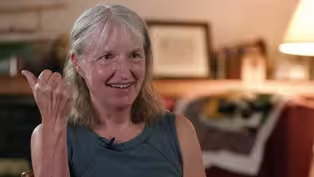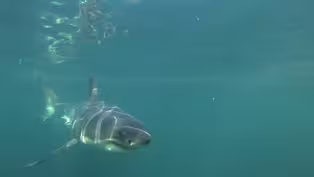
The Right Path
Clip: Season 5 Episode 21 | 8m 48sVideo has Closed Captions
A former Providence Journal columnist and editor is forging a new path hiking Rhode Island.
Former Providence Journal reporter and editor, John Kostrzewa, is foraging a new career and a new path in life. He's hiking through some of the most breathtaking turf in Rhode Island. His new book includes discoveries he's made along the way in forests, shorelines, and nature preserves, and explores local lore and legends—including sightings of the Monkey Man, Rhode Island's version of Bigfoot!
Problems playing video? | Closed Captioning Feedback
Problems playing video? | Closed Captioning Feedback
Rhode Island PBS Weekly is a local public television program presented by Ocean State Media

The Right Path
Clip: Season 5 Episode 21 | 8m 48sVideo has Closed Captions
Former Providence Journal reporter and editor, John Kostrzewa, is foraging a new career and a new path in life. He's hiking through some of the most breathtaking turf in Rhode Island. His new book includes discoveries he's made along the way in forests, shorelines, and nature preserves, and explores local lore and legends—including sightings of the Monkey Man, Rhode Island's version of Bigfoot!
Problems playing video? | Closed Captioning Feedback
How to Watch Rhode Island PBS Weekly
Rhode Island PBS Weekly is available to stream on pbs.org and the free PBS App, available on iPhone, Apple TV, Android TV, Android smartphones, Amazon Fire TV, Amazon Fire Tablet, Roku, Samsung Smart TV, and Vizio.
Providing Support for PBS.org
Learn Moreabout PBS online sponsorship- That's the most surprising, interesting part.
Whenever you set out with a new trail that never been on before, it's intriguing because you really don't know what you're gonna find and what you're gonna see.
It's eyeopening.
- [Pamela] Taking in the exquisite views and exploring beautiful byways is a new calling for veteran newspaperman John Kostrzewa.
He is hiking and writing his way along Rhode Island's most breathtaking trails and discovering a bend in the road is not the end of the road.
- It was not an easy, straight path.
When I left the Providence Journal in 2017, I didn't really have a clear idea of what I wanted to do next or whether I'd ever work again.
- Kostrzewa worked more than four decades as a print journalist and spent the majority at the Providence Journal as a business columnist and editor.
What was it like to go from the world of high finance to forests?
- It was probably the furthest thing from my mind.
I think like a lot of people who retire, they're not quite sure what the next chapter's gonna be, though they know they want to contribute something, and so you find your way.
And luckily I found the path to hiking.
- [Pamela] Kostrzewa says he did a bit of recreational hiking years ago, especially when his sons were Boy Scouts.
He took it up again after retiring as a way to improve his health and sharpen his mind and spirit.
It was during the pandemic quarantine when he noticed an uptick on the trails.
- When I went in the woods, who are all these people?
Some of the Land Trust folks will tell you that three times as many people were hiking during COVID than before COVID.
Don't forget, we had a governor who said take it outside, and we literally did.
- [Pamela] So he did something outside the box.
- I approached the editors of the journal and they said, "You want to do what?"
And I said, "I want to write a column about hiking."
I said, "Look, it's pretty simple.
All I want to do is take people where they haven't been before.
If they've been there before, show them something different about the history or the geology or the wildlife."
- [Pamela] And he says... - There were a lot of readers who were never gonna hike.
They were never gonna go in the woods.
But in the middle of that first COVID winter, they really just wanted something good to read about Rhode Island.
- [Pamela] Instead of telling him to go take a hike, the journal editors brought Kostrzewa's career full circle.
Three years and 150 columns later, what started out as a trial run is now a regular route.
Kostrzewa's Sunday column is called Walking Rhode Island.
He's compiled 40 of the feature stories in his new guidebook by the same name.
And while the topic is far from his former beat, he says the essential skills are similar.
- I'm not a trained historian.
I'm not a trained geologist.
I'm not a trained birder.
What I have been trained in 42 years is to observe, to look to the right, look to the left, and see things, and then try to figure it out.
And then if I can't figure it out myself, then find those experts to talk to that explain it to me.
- [Pamela] In the book, there are nature walks for families, challenging hikes for the experienced, even urban explorations.
- There's a wonderful hike through West Warwick along the bike path, which you walk right through this old industrial area and as you're walking on a trestle along the bike path, you smell this sweet smell, this fragrance and aroma.
You say, "What could this possibly be?"
Well, that's the Bradford Soap Works.
- [Pamela] Also in his guidebook, Kostrzewa includes coastal climbs along Ocean State shorelines, such as Black Point in Narragansett.
- A lot of historical sites along the trail always fascinate me 'cause it really shows you how we lived 200, 300 years ago.
And you'll see foundations right along the trail.
You will see sluiceways built, you know, to speed up the water, to run lumber mills or gristmills.
And I'm always interested to find out, well, who built those?
How long ago and why?
And you put that all together and then you decide, okay, well, what story do I want to tell now?
- [Pamela] The stories start with reading online sources about the area, then stuffing basic supplies in his backpack, first aid kit, rain gear, compass and GPS, insect repellent, water and energy bar.
And because he says he's old school, he carries a map, where he makes notations and writes questions to research later.
And then he sets off, usually twice a week, following the blaze, these numbered markings that point out the trail.
Kostrzewa says he hasn't run into any dangerous wild animals, but he has encountered some fascinating lore and legends.
For instance, in Cumberland, the locals speak of the supernatural surrounding the newly opened Catamint Brook Preserve off Tower Road.
- They've seen children along the road, they've seen ghosts along the road, and then they've seen a creature they call Monkey Man, which I have never seen and never heard of.
- Like Bigfoot?
- Yeah, I guess some type of monkey-like, apelike creature that somebody had seen at one point, and for some reason it caught into the imagination of the folks there.
- Yep.
Do you imagine that we'll run into Rhode Island's Bigfoot out here?
- Well, I certainly hope not.
- [Pamela] During a walk through the preserve, we didn't see the Ocean State Sasquatch, but we did observe rambling stone walls, the remains of a one-room schoolhouse from the 1800s that burned to the ground.
We also trekked through colonial farmland.
- If you look back to the late 1700s, there was a census done and two-thirds of Rhode Island, 66% of all the land had been cleared of trees.
250 years after the farmers left, this is all we call second growth forest.
- [Pamela] And amid all the trees, there is a sound of silence.
- You have to be a little bit quiet in the woods.
Certainly nothing wrong with talking to each other and sharing stories, but the louder you are, the less of the wildlife you're gonna see, the less of those great bird tweets you're gonna hear.
You're not gonna hear those waterfalls you walk by.
- [Pamela] With that advice, Kostrzewa is following in the footsteps of his former Providence Journal colleague, the late Ken Weber, a noted columnist and outdoorsman who also wrote about rambles in Rhode Island.
Kostrzewa pays tribute to his mentor in this excerpt from his book.
- "Hiking should not be a race through the woods, but a chance to pause along the way, explore, and think.
I don't consider walking a competitive sport or endurance event," he wrote.
For a guy who was always racing on deadlines at the newspaper, that is wise, sage advice.
- [Pamela] And so Kostrzewa says he takes that to heart on all his journeys until he reaches the end of the trail.
- When I come out of the woods, if I'm hiking with a friend, we'll each do a tick check with each other to make sure we're not bringing anything home.
And then when I do get home, I'll go to the backyard, set up a lawn chair, and strip down right there.
- How do the neighbors feel about that?
(both laugh) - I haven't heard, but no complaints as of yet either.
- Oh, good.
(laughs) But all kidding aside... What do you love the most about wandering?
- Well, wandering is a good term.
I was just reading a book from Thoreau going way back, and he would never call it walking or hiking.
He called it sauntering because he said the idea, almost like what Ken Weber said, is that you don't go to rush through the woods, you go to explore the woods and experience the woods, which is why I say I hope to continue to hike and to continue to write until somebody tells me to stop.
- The most common question John Kostrzewa gets asked
Video has Closed Captions
Clip: S5 Ep21 | 9m 24s | The hidden history of Martha’s Vineyard Sign Language. (9m 24s)
Video has Closed Captions
Clip: S5 Ep21 | 7m 9s | Atlantic White Shark Conservancy biologists tag sharks off the coast of Cape Cod. (7m 9s)
Providing Support for PBS.org
Learn Moreabout PBS online sponsorship
- News and Public Affairs

Top journalists deliver compelling original analysis of the hour's headlines.

- News and Public Affairs

FRONTLINE is investigative journalism that questions, explains and changes our world.












Support for PBS provided by:
Rhode Island PBS Weekly is a local public television program presented by Ocean State Media

